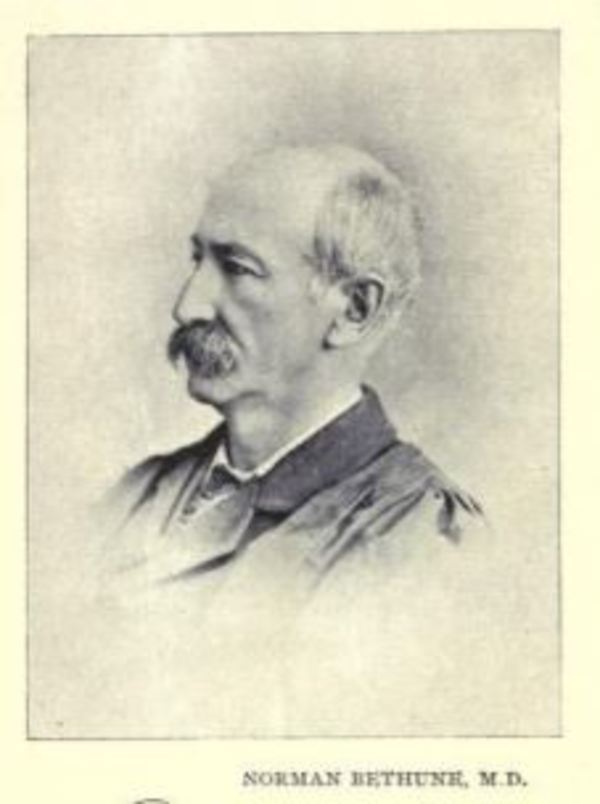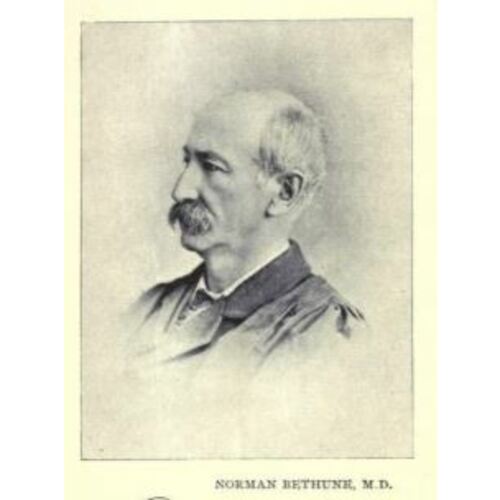As part of the funding agreement between the Dictionary of Canadian Biography and the Canadian Museum of History, we invite readers to take part in a short survey.

Source: Link
BETHUNE, NORMAN, physician and medical educator; b. 13 Aug. 1822 in Moose Factory (Ont.), son of Angus Bethune*, an NWC and HBC fur trader, and Louisa McKenzie; m. first 1851 Janet Ann Nicolson, and they had three sons and four daughters; m. secondly Helen King, the widow of Dr Winer of Hamilton, Ont.; d. 12 Oct. 1892 in Toronto.
Norman Bethune’s father, a successful fur trader, had family connections through his brothers with the social and political élite of Upper Canada. In 1840 he brought his family to Toronto and enrolled Norman in Upper Canada College. From 1842 to 1845 Bethune studied for an arts degree at King’s College in Toronto and then entered the college’s medical school in 1845–46. Like many ambitious young men he went to London, England, to attend King’s College and Guy’s Hospital, graduating as a member of the Royal College of Surgeons in 1848.
When he returned to Toronto after a trip to Hudson Bay in 1849, Bethune joined four other doctors in setting up the city’s third medical school: the Upper Canada School of Medicine. (The other two were John Rolph*’s Toronto School of Medicine and King’s College.) He was thus introduced to educational politics. The secularization of King’s College, which was renamed the University of Toronto in 1850, so enraged Bishop John Strachan* that he undertook the creation of a Church of England university as an alternative to the “godless” education provided by the government-controlled institution. As staunch Anglicans, Bethune and his colleagues Edward Mulberry Hodder*, James Bovell*, Henry Melville, William Hallowell, and Francis Badgley* offered to make their school the medical faculty of the new college, Trinity; classes began in the fall of 1850. Bethune taught anatomy and physiology, and would serve as dean in 1855–56. He also contributed to the Upper Canada Journal of Medical, Surgical and Physical Science, published by his colleagues at Trinity between 1851 and 1854.
Controversy dogged Toronto’s medical schools during the decade. In 1853 the medical faculty of the University of Toronto was abolished, leaving the medical faculty of Trinity College and the Toronto School of Medicine [see William Thomas Aikins] in competition. As a proprietary school, the Trinity faculty was dependent on student fees for professors’ salaries, supplies, and the rental or construction of facilities. In 1856 the staff agreed to advertise that they would teach “occasional students” who would not be required to subscribe to Anglican religious tests in order to graduate. Led by Bishop Strachan, Trinity’s council called the doctors to account. As dean, Bethune responded to the criticism and on 2 July delivered the faculty’s mass resignation.
Like most of his colleagues, Bethune joined the Toronto School of Medicine, which ended its affiliation with Victoria College, Cobourg, that October [see John Rolph]. He taught descriptive anatomy there in the late 1850s before going with his family to Edinburgh, where he practised surgery after qualifying as a licentiate of the Royal College of Surgeons in 1860. The previous year he had spent some time studying in Strasbourg, France, and after the battle of Solferino (Italy) assisted in caring for the wounded. By 1869 he had returned to Toronto and joined the medical faculty of Victoria College as professor of the principles and practice of medicine. He supported the negotiations to re-establish Trinity’s medical school provided that no religious barriers were imposed. When this condition was met and the school reopened in 1871, he accepted the post of professor of surgery, which he held until 1881.
Little is known of the final decade of Bethune’s life except that in 1888 he is listed as a consulting physician for the Toronto General Hospital. Both his eldest son and his second wife died during these years, and he and his family moved frequently. His career had spanned the period of the separation of religion and science and the gradual shift from proprietary to government-supported medical education, which culminated in the re-establishment of the University of Toronto’s faculty of medicine in 1887. His grandson Henry Norman Bethune*, also a physician, would achieve renown for his work in pneumothoracic surgery and for his service in China with the army of Mao Tse-tung in 1937–39.
AO, MU 3023, W. B. Geikie, history of Trinity Medical College, 1906. NA, RG 31, C1, 1881, Toronto. Trinity College Arch. (Toronto), Council minutes, 24 June 1856; Geneal. file, Bethune family. Canada Lancet (Toronto), 3 (1870–71): 337. Canadian album (Cochrane and Hopkins). Canadian almanac, 1859–60. Toronto directory, 1850–89. Trinity Medical College, Announcement (Toronto), 1871–81 (copies at Trinity College Arch.). William Canniff, The medical profession in Upper Canada, 1783–1850 . . . (Toronto, 1894; repr. 1980). Hist. of Toronto, 2: 9. G. W. Spragge, “The Trinity Medical College,” OH, 58 (1966): 63–98.
Cite This Article
Heather MacDougall, “BETHUNE, NORMAN,” in Dictionary of Canadian Biography, vol. 12, University of Toronto/Université Laval, 2003–, accessed March 28, 2025, https://www.biographi.ca/en/bio/bethune_norman_12E.html.
The citation above shows the format for footnotes and endnotes according to the Chicago manual of style (16th edition). Information to be used in other citation formats:
| Permalink: | https://www.biographi.ca/en/bio/bethune_norman_12E.html |
| Author of Article: | Heather MacDougall |
| Title of Article: | BETHUNE, NORMAN |
| Publication Name: | Dictionary of Canadian Biography, vol. 12 |
| Publisher: | University of Toronto/Université Laval |
| Year of revision: | 1990 |
| Access Date: | March 28, 2025 |



